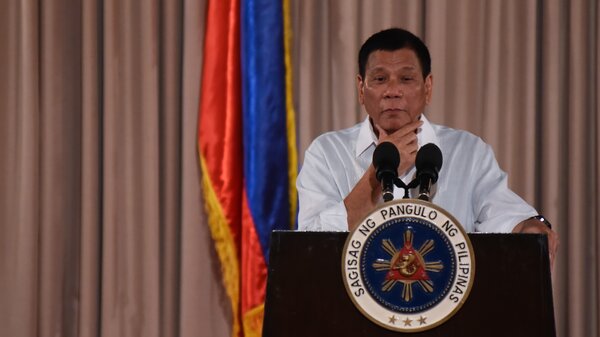Water Wars: The Philippines Pivots Towards Beijing
Duterte threatens to "cross the rubicon" with United States

President Duterte during an award ceremony on Monay (Photo: NPR)
Published by The Lawfare Institute
in Cooperation With

Duterte threatens to "cross the rubicon" with United States

President Duterte during an award ceremony on Monay (Photo: NPR)
For at least the past month, Philippine President Rodrigo Duterte has sharply critiqued United States military policy and suggested a cooler relationship with Washington, pivoting away from his predecessor’s closer relationship with the United States. At the same time, however, President Duterte has been ambiguous about to the extent to which he believes bilateral relations should change. A series of statements from the past week add to this uncertainty.
On Monday President Duterte said that he would “open alliance with China and . . . Medvedev,” though he recognized that it was not time to “really break ties” with the United States. He also claims to have told Prime Minister Medvedev that “I’m about to cross the Rubicon between me and the United States, at least for the 6 years” and that “I will need your help in everything – trade, commerce – and I will open up.” Asked to clarify these statements, Duterte expressed concern that the United States would not aid the Philippines if attacked. The President also explained that he intended to open economic, not military, alliances with China and Russia.
Later in the week, President Duterte announced that combined war games in October will be the last combined US-Philippine military exercises. He also stated that joint naval patrols in the South China Sea would end because they risk putting the Philippines in the middle of a military confrontation between China and the United States. In what has become something of a confusing pattern, U.S. State Department Spokesperson John Kirby responded that his government was not aware of any official notification about ending combined war games. Philippine Foreign Secretary Perfecto Yasay also assured reporters that only joint patrols in the South China Sea were being suspended.
Notwithstanding these conflicted messages, the Duterte administration does seem to be projecting a different type of South China Sea strategy. National Security Adviser Hermogenes Esperon Jr. argued that President Duterte wants to “demilitarize” the South China Sea. Secretary Yasay stated that the Duterte administration would work on conflicts with China “in a very quiet diplomatic way.” Reports also indicate that the Philippines will prioritize fishing rights near Scarborough Shoal, legitimizing the status of Philippine domestic workers in China without proper papers, and Philippine business interests during negotiations with Beijing.
And there is evidence that this new strategy has changed the relative position of China and the United States in the South China Sea. Jiang Wei at the Global Times, a paper run by the Chinese government, praised Duterte as a “pragmatic politician” who is using “competition between Beijing and Washington to win Manila maximum benefits.” Jane Perlez at the New York Times concludes that China has put its plans for militarizing Scarborough Shoal, a Chinese-controlled feature near a military base used by the US, on hold to “wean [the Philippines] away from its treaty alliance with Washington.” Richard Heydarian at Al Jazeera finds that Duterte’s warmer relationship with Beijing has “undermined the US’ strategy against China.” Similarly, Yuko Mukai and Keita Ikeda at The Yomiuri Shimbun argue that President Duterte has made it more difficult for Japan and the United States to create a coalition that can effectively deter China.
All of which leaves the United States, which had depended on leveraging close relationship with the Philippines after the arbitral tribunal award to hedge against Chinese action, in a difficult position. Secretary Yasay admitted that U.S. officials were concerned about losing “whatever gains that we have achieved insofar as the arbitral tribunal ruling is concerned,” though he said that this would not be the case. Relations may become even more complicated if the two countries cannot agree on how to disperse $6.7 million in law enforcement aid. Given that the U.S. Navy has fallen behind on its plan to make two freedom of navigation operations through the South China Sea per quarter, some are arguing for a serious reappraisal of United States policy in the South China Sea.
In other news...
Japan
The Air Self-Defense Force scrambled fighter jets on Sunday as the Chinese People’s Liberation Army Air Force (PLAAF) deployed over forty aircraft through a body of water separating Okinawa and Miyako in the East China Sea. The 40 aircraft included Su-30 fighters, bombers, and refueling aircraft, none of which entered Japanese airspace. The PLAAF described this deployment as a “routine drill on the high seas” designed to “carefully monitor and judge the foreign military aircraft that enter the anti-aircraft defense zone, to take measures to respond to different threats in the sky, and to protect national airspace.” China declared an Air Defense Identification Zone (ADIZ) in the East China Sea three years ago, requiring that all aircraft receive permission from Chinese authorities before transiting the zone. This ADIZ been criticized by the United States, Japan, and South Korea, amongst others.
Responding to the deployment, Chief Cabinet Secretary Yoshihide Suga said that “Japan continues to watch the Chinese military’s activity, which has become expansive and more active” and that “we are determined to defend our land, territorial waters and the skies.” A PLAAF Spokesperson retorted that the action was “necessary to safeguard national sovereignty, the country’s security and maintain peaceful development.” Two days later, Chinese Information Minister Jiang Jianguo reinforced this message by urging Japan not to interfere in South China Sea territorial disputes.
Speaking one day after this PLAAF deployment, Admiral Tomohisa Takei, head of Japan’s Maritime Self-Defense Force, said that the “door is always open” to bilateral exchanges between senior Chinese and Japanese naval officers. While criticizing China for its actions in the East China Sea, he also clarified that there were no plans “at this time” to join the United States in freedom of navigation operations in the South China Sea.
China
On Thursday PLAAF Spokesperson Shen Jinke said that patrols in the South China Sea have become “regular” practice to improve their combat readiness. Spokesperson Shen also stated that the PLAAF would “regularize” offshore drills beyond the first island chain. Additionally, Li Yingcheng, affiliated with the Chinese Academy of Surveying and Mapping, told the 6th China International UAS Conference that China is now capable of deploying domestically-designed drones to waters surrounding the Senkaku/Diaoyu Islands and other South China Sea maritime features. He intimated that drones would be used to obtain “precise information” on the geology of reefs and islands for “demarcation of territorial waters and for safeguarding national maritime interests and security.”
On Wednesday Ma Xiaoguang, Spokesperson for the State Council Taiwan Affairs Office, urged Taiwanese President Tsai Ing-wen’s administration to safeguard the Senkaku/Diaoyu Islands and South China Sea as the Chinese nation’s “ancestral possessions.” For our Mandarin readers, the State Oceanic Administration also released China’s annual statistical report on ocean development.
Singapore
Prime Minister Lee Hsien Loong, during a visit to Japan, said that Singapore has “key interests” in the South China Sea, despite the fact that it is not a claimant State and does not take sides on the dispute. These interests include “freedom and navigation and overflight” and “a rules-based regional and international order . . . that upholds and protects the rights and privileges of all states and shows full respect for legal and diplomatic processes in the resolution of disputes.” Speaking more broadly, Prime Minister Lee welcomed a stable and prosperous China while also encouraging it to “be mindful of the natural unease and apprehension that its rapid rise elicits in its neighbours and other powers.” By allowing a “law of the jungle” to prevail, Prime Minister Lee argued, small nations were bound to fall under the control of more powerful States.
Singapore’s Ambassador to China also made a splash this week through an ongoing row with the Global Times over the paper’s allegations that Singapore tried to raise criticism of China’s actions in the South China Sea during a Non-Aligned Movement meeting in Venezuela. The Global Times insists that “reliable source[s]” confirmed that Singapore delegation was “infuriated when most of the countries objected to its request” that countries endorse the South China Sea arbitration. Chinese Foreign Ministry Spokesperson Geng Shuang asserted that “individual countries insisted on highlighting” the arbitral award. Singaporean Ambassador Stanley Loh, however, insists that his government only supported a collective ASEAN submission on the matter.
United States
Chief of Naval Operations Admiral John Richardson cautioned against inflating China’s near-term Anti-Access/Area Denial capabilities, particularly in the South China Sea, given the technical sophistication operational difficulty involved. He also argued that cooperation with China can help build mechanisms that minimize needless risks from bilateral competition.
We are likely to hear a lot less about competition with China from the Pentagon in the remaining months of the Obama administration. The Navy Times reports that the National Security Council admonished Pentagon leaders to find a less inflammatory phrase for describing the US-China relationship. A senior administration official, commenting on the order, said that, “We don’t buy into the notion that an established and rising power are destined for conflict.”
The Philippines
The Philippine Coast Guard released a belated report that three Chinese Coast Guard ships drove away three Philippine fishing vessels near Scarborough Shoal on September 6th. The report states that there was a brief chase and heated exchanges, though the Philippine fishermen did not leave Scarborough Shoal until the next morning.
Vietnam
Philippine Department of Foreign Affairs Assistant Secretary Charles Jose announced that President Duterte will discuss law enforcement and defense cooperation during his upcoming trip to Hanoi. In a similar vein, Vietnam and the United States inaugurated an expanded exchange program to prevent unplanned hostilities in Asia-Pacific waters.
Indonesia
General Gatot told reporters that construction of military bases on Natuna Island, Indonesia’s closest territory to disputed South China Sea waters, is on track to be completed in two to three years. General Gatot also said that Indonesian “territories cannot be compromised, it’s already whole and fixed.”
Analysis, Commentary, and Additional Information
Much of this week’s scholarship focused on policy recommendations for the Obama administration. Ryan Pickrell at The Daily Caller calls on the United States to respond to what Dr. Andrew Erickson calls China’s maritime militia. Photos of this militarized fishing fleet can be found here. Dennis Blair and Jeffrey Hornung at The Diplomat assess opportunities for preventing China from changing the status quo. Stanley Weiss at The World Post urges the next U.S. administration to pivot to Indonesia.
Other authors took a longer view on relations with China. John Grady at USNI News summarizes Bill Hayton’s arguments that China’s historic claims lack historic support. Dr. Amy Searight at CSIS analyzes diplomacy and security after the arbitral tribunal ruling. Finally, the Lowy Interpreter provides a compendium of articles summarizing nine years of debate on Australia’s relationship with China.
Water Wars is our weekly roundup of the latest news, analysis, and opinions related to ongoing tensions in the South and East China Seas. Please email Chris Mirasola with breaking news, relevant documents, or corrections.





